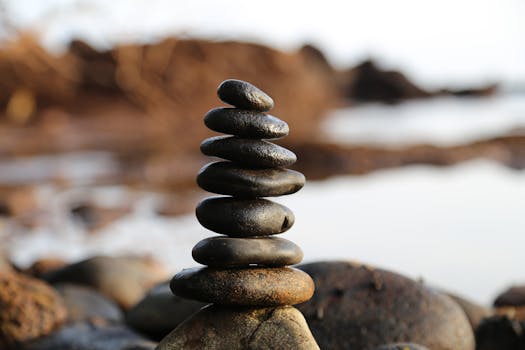
“
Mindfulness Practices for Stress Relief: A Comprehensive Guide
Mindfulness for Stress Relief

Mindfulness practices have become increasingly popular in recent years, and for good reason. This powerful tool can help reduce stress and anxiety, improve mood, and enhance overall well-being. Mindfulness is the practice of being present in the moment, paying attention to thoughts, feelings, and sensations without judgment. By incorporating mindfulness into your daily routine, you can experience a significant reduction in stress and improvement in mental health. For more tips on enhancing your well-being, check out our Natural Remedies for Common Ailments: A Guide to Wellness.
What is Mindfulness?
Mindfulness is a state of awareness that involves paying attention to the present moment, while letting go of distractions and judgments. It’s about being fully engaged in the current experience, whether that’s walking, eating, or simply breathing. Mindfulness is not just a technique, but a way of living that can help you cultivate greater awareness, clarity, and calm in your daily life. Explore more about this concept in our post on Creativity Thrives in Contrast: Unlocking Your Full Potential.
Benefits of Mindfulness for Stress Relief

The benefits of mindfulness for stress relief are numerous and well-documented. Some of the most significant advantages of mindfulness practice include:
- Reduced stress and anxiety
- Improved mood and emotional regulation
- Enhanced cognitive function and focus
- Better sleep quality
- Increased self-awareness and self-acceptance
- Improved relationships and communication skills
Mindfulness Techniques for Stress Relief
There are numerous mindfulness techniques that can help with stress relief, including:
- Meditation: Sitting or walking meditation can help calm the mind and reduce stress.
- Deep Breathing: Focusing on the breath can help calm the nervous system and reduce anxiety.
- Body Scan: Paying attention to bodily sensations can help release tension and promote relaxation.
- Mindful Movement: Engaging in physical activities like yoga or tai chi can help cultivate mindfulness and reduce stress.
- Guided Imagery: Using visualization techniques can help create a sense of calm and relaxation.
Incorporating Mindfulness into Daily Life

Mindfulness is not just a practice, but a way of living. By incorporating mindfulness into your daily routine, you can experience greater calm, clarity, and joy in your life. Here are some tips for incorporating mindfulness into your daily life:
- Start small: Begin with short mindfulness practice sessions, such as 5-10 minutes a day, and gradually increase as you become more comfortable with the practice.
- Make it a habit: Incorporate mindfulness into your daily routine, such as right after waking up or before bed.
- Be consistent: Aim to practice mindfulness at the same time every day, so it becomes a consistent part of your routine.
- Find what works for you: Experiment with different mindfulness techniques and find what works best for you and your lifestyle.
Conclusion
Mindfulness practices offer a powerful tool for stress relief and overall well-being. By incorporating mindfulness into your daily routine, you can experience a significant reduction in stress and improvement in mental health. Remember to start small, be consistent, and find what works best for you. With regular mindfulness practice, you can cultivate greater awareness, clarity, and calm in your life, and enjoy a more peaceful and fulfilling existence. For additional insights on maintaining a balanced lifestyle, visit our article on Healthy Meal Prep Ideas for Busy Lifestyles.
See more:
https://www.mindful.org
https://www.headspace.com
https://www.calm.com






